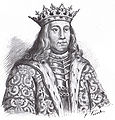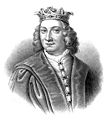Danish-Swedish War (1470–1471)
| date | 1470 to 1471 |
|---|---|
| place | Sweden |
| Casus Belli | Death of the Swedish rival king Charles VIII. |
| output | Danish defeat |
| consequences | Sweden claims its independence from the Kalmar Union |
| Peace treaty | 1472 and 1483 in Kalmar |
| Parties to the conflict | |
|---|---|
| Commander | |
|
|
|
The Danish-Swedish War from 1470 to 1471 was a stage in the fighting for Sweden during the Kalmar Union . Since 1464 Sweden was in a revolt against the Danish Union King , who had tried in vain to restore his rule in 1468/69. After the death of the Swedish rival king, he tried again in 1470, which failed in 1471. The decisive battle on Brunkeberg was later mythically exaggerated in the Swedish national consciousness as the victory of the Swedish striving for independence.
prehistory
The Kalmar Union , formed by Denmark , Norway and Sweden in 1397 , broke up as a result of the Danish-Hanseatic War over the Sundzoll and a Swedish revolt in 1434/36. Instead of the Danish Union King Christian I , the Swedish imperial administrator Karl Knutsson Bonde was proclaimed as Charles VIII to be the antagonist.
After Charles' (first) overthrow by the pro-Danish or pro-Union party at the Swedish court, Christian was also recognized in Uppsala and Stockholm in 1457, but was defeated by Haraker in 1464 and ousted again by Karl. Although Karl was expelled again in 1465, Christian was unable to assert himself again despite the internal Swedish power struggles in Stockholm. In 1467, Karl returned to power in Christian's place. Only in Axevalla (Axvall near Skara , Västergötland), Kalmar and Borgholm (on Öland ) were Danish garrisons.
War of 1468/1469
Since Charles refused all offers to negotiate, fighting between Danes and Swedes again began in 1468, mainly in Småland and Västergötland , but also in Uppland (the region around Uppsala) and Västmanland .
The Danes or their Swedish allies under Erik Karlsson Wasa first won at Arboga , Knutby (Uppland), Flötsund (Flottsund, near Uppsala) and in Roslagen , but were then led by Karl's commanders at Västerås , Hedemora and Oppboga (near Örebro , Västmanland) Sten Sture and Niels Sture beaten.
Axevalla (Axvall) also fell into Swedish hands and was finally burned down. Christian, who then intervened himself, was defeated by the two Stures at Öresten (near Kinna , Västergötland) in 1469 . Christian withdrew and Karl was able to consolidate his rule. In October 1469, both sides negotiated an armistice with Lübeck.
War of 1470/1471
Charles's death in May 1470 offered Christian a chance to renew his claims to the Swedish throne. However, on his deathbed, Karl had appointed his general and nephew Sten Sture as his successor. Sten Sture's rivals and the pro-Danish part of the high nobility and the bourgeoisie, however, united in an uprising. However, the rebels were beaten near Trögd (near Enköping , Uppland) and Läby (near Uppsala) - their leader Erik Karlsson fled to Kalmar, where he was besieged by Sten Sture. In May 1471 Sten Sture was proclaimed imperial administrator in Arboga. Christian then set out in July 1471 with a large fleet and a large army to a show of force against Stockholm.
Christian I sought his return to the Swedish throne.
The Swedish rival king Charles VIII died in 1470.
Karl's nephew Sten Sture the Elder became the new imperial administrator.
With at least 70 ships and an army that consisted not only of Danish and Norwegian, but also largely of German and Scottish mercenaries, Christian anchored in the Stockholm suburb of Blasieholmen in September 1471 and called for negotiations on a settlement. The negotiations, led by the union-friendly Swedes and led by Archbishop Jakob Ulfsson as mediator, used Sten Sture's supporters to reinforce and bring their armed forces up. During the negotiations Sten Sture captured Älvsborg fortress and defeated Danish troops that had invaded Västergötland. After several weeks of unsuccessful negotiations, Christian then ordered the disembarkation of his troops in October 1471, which went ashore in the Stockholm suburb of Norrmalm . Stockholm refused entry and was besieged, but Christian advanced as far as Uppsala, where he received homage from the Pro-Danish part of the Swedish aristocracy and strengthened his army with union-friendly Swedish farmers.
In the meantime, Sten Sture had gathered his army in Vadstena ( Östergötland ), while Niels Sture raised a Swedish nationalist peasant army in Dalarna . Both advanced to the relief of the capital defended by Jakob Ulfsson and united at Rotebro (near Sollentuna , Uppland). At Brunkeberg (near Stockholm) Christian's army got between the two Stures and on October 10th there was one of the bloodiest battles in Swedish history. Christian's Danes and his mercenaries initially held the heights, but the unionist Swedish peasant contingent broke up under the attacks of the Stures. Wounded, Christian had to retreat to his ships with great losses and sailed back to Denmark.
consequences
After his defeat, Christian relied on negotiations. Peace was made in Kalmar in July 1472. Both Denmark and Norway as well as Sweden adhered to the unity of the three empires, at least ideally, and promised each other - subject to the approval of all three imperial councils - support in the event of war or at least benevolent neutrality. The pro-Danish insurgents in Sweden were to be pardoned and rehabilitated. In addition, a common economic area with freedom of movement for the residents of all three kingdoms was agreed.
However, answering the important issue of who should be the Union King was postponed and transferred to a mixed commission of Swedish and Danish councilors to examine Christian's claims.
It was not until July 1476 that the planned commission met. The negotiations, in which the Pope was also involved, were, however, delayed by the Swedish side, despite extensive Danish concessions to Sweden's independence and special rights, until Christian finally died in May 1481 without having returned to Sweden.
When Sten Sture was confronted with another Pro-Danish conspiracy in 1483, he finally agreed to a compromise negotiated in Halmstad in February 1483 and in Kalmar in September 1483 , the so-called Recess of Halmstad or Recess of Kalmar (Kalmar Recess). Christian's successor Johann was given the prospect of being appointed King of Sweden as soon as certain open questions, such as the handover of the Danish-controlled Gotland and the Borgholm fortress to Sweden, were resolved. Neither Sten Sture nor Johann were henceforth willing to honor these agreements. In 1497 at the latest there was therefore another war between Sten Sture and King Johann .
literature
- Harm G. Schröter: History of Scandinavia (= Beck'sche series. 2422). CH Beck, Munich 2007, ISBN 978-3-406-53622-9 , p. 35.
- Robert Bohn : Danish history (= Beck'sche series. 2162). CH Beck, Munich 2001, ISBN 3-406-44762-7 , p. 40.
- Franklin D. Scott: Sweden. The Nation's History. Enlarged edition, 5th print. Southern Illinois University Press, Carbondale IL et al. 1988, ISBN 0-8093-1513-0 , p. 96 ff.
- Daniel G. von Ekendahl: History of the Swedish people and empire. Part 2, Department 1. Landes-Industrie-Comptoir, Weimar 1828, pp. 224-237 .
- Karl D. Hüllmann : History of Denmark. Wilke, Warsaw 1796, p. 237 f.




